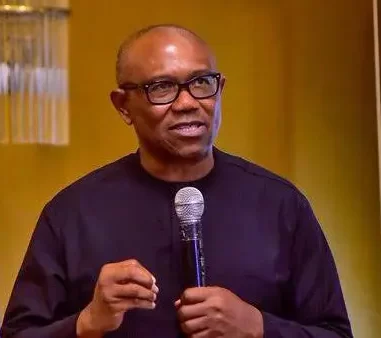Presidential candidate of the Labour Party, Mr Peter Obi has called on the Commonwealth nations to prioritize the empowerment of small businesses, emphasizing that the move would pave the way for sustainable development across countries.
He made the made call while addressing leaders gathered at a global conference organized by the Bangladesh Government in conjunction with the Commonwealth Enterprise and Investment Council in Lagos on Monday.
Join our WhatsApp ChannelMr. Obi, a former governor of Anambra State, highlighted the significance of SMEs in critical aspects of the economy, including job creation, innovation, and domestic investment.
He argued that by enhancing the functionality and impact of SMEs across Commonwealth nations through formalization and internationalization, the world could witness positive transformations in the lives of people, communities, and economies on a global scale.
READ ALSO: AUD/USD: RBA Caution Meets Fed’s Tightrope, Trades Near 0.6430
“Endowed with a population of about 2.5 billion people, a home to over a billion young consumers and exports of over $1 trillion, the need for better support for SMEs cannot be over-emphasized,” Mr. Obi declared.
He drew attention to the challenges faced by small businesses in emerging markets, stemming from a lack of formalization and internationalization. Many SMEs remain unregistered, lack licences, and miss out on the benefits of international trade, which restricts both their growth opportunities and those of their respective countries.
“To harness the full contributions and impacts of SMEs, proper reforms such as formalization and internationalization are needed to address the identified challenges,” he asserted.
Formalization entails bringing SMEs into the formal economy through business registration and compliance with legal and regulatory requirements, a process expected to yield benefits not only for SMEs but also for the overall business environment and economic stability.
Mr. Obi also pointed out that a significant portion of SMEs operate in the informal sector due to resource constraints or a lack of awareness regarding the benefits of formalization.
He substantiated his argument by referencing World Bank records from 2020, which indicate that SMEs account for roughly 90 percent of global businesses and more than 50 percent of jobs created globally.
Their contribution to national income (GDP) in Developing and Emerging Markets (DEMs) can reach up to 40 percent, and this impact increases significantly when informal SMEs are included.
The LP presidential candidate provided examples to illustrate the substantial influence of SMEs in various countries. In Bangladesh, SMEs contribute about 40 percent to GDP, in Nigeria 48 percent, and in China, a remarkable 60 percent, with about seven out of every ten formal jobs created by SMEs. India, too, experiences a similar scenario, with SMEs accounting for over 40 percent of the total workforce.
However, Mr. Obi emphasized that the limited access to credit, markets, and government support hindered SMEs, leading to reduced investment, innovation, and growth opportunities.
He argued that addressing these challenges was particularly crucial for Commonwealth nations, as they collectively control a vast wealth of approximately $150 trillion, more than ten times their combined GDP.
He said: “Hence, these untapped benefits the Commonwealth despite controlling one-third of the global population only contributes below 15 percent of the World GDP of $100 trillion and with a global GDP per capita of $10,700.
“While that of the commonwealth is 3,500 dollars, this shows a huge growth potential, which can be enhanced by investment in SMEs where the bulk of the youths are domiciled, especially within the commonwealth family.”
Furthermore, Mr. Obi stressed that SMEs in Commonwealth countries played a vital role in economic development and poverty reduction. He urged the adoption of supportive policies, capacity-building initiatives, and strategic partnerships to empower SMEs and enhance their competitiveness in the global economy.
He called for the active involvement of all stakeholders, particularly the Commonwealth organization and the governments of Commonwealth countries, to achieve these goals.
Emmanuel Ochayi is a journalist. He is a graduate of the University of Lagos, School of first choice and the nations pride. Emmanuel is keen on exploring writing angles in different areas, including Business, climate change, politics, Education, and others.


















Follow Us